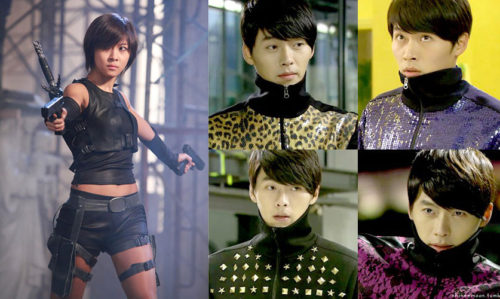K-drama review: Secret Garden

Like everyone else, I was devastated (in a good way) by the ending of Fleabag. Unlike (I’m guessing) everyone else, my reaction was to seek out the most cliched happy-ending romance I could find. And where better to find that than K-drama? This was one of the titles recommended to me early on as a K-drama classic, so I figured it would have the necessary ingredients.
Oh my. This was the most addictive K-drama for me since Boys Over Flowers. It’s from about the same time and covers much of the same territory, so that makes sense. In Secret Garden (SBS 2010) our leads are stuntwoman Gil Ra-im (played by Ha Ji-won) and CEO Kim Joo-won (Hyun Bin). As these tales always begin, she is poor but badass; he is rich and a total douche.
They cross paths when Joo-won steps in to help his cousin U-yeong (Yoon Sang-hyun) – who is a Hallyu star better known as Oska – escape a thorny romantic entanglement with an actress. When Joo-won tries to collect the actress from a film set, he accidentally ends up with her body double – Ra-im. The two immediately have a sparky, catty back-and-forth and it’s clear that hate will turn to love.
But first, there’s rather a lot of Joo-won being an asshole, telling Ra-im repeatedly how far below him she is, how much she embarrasses him. Thankfully, she doesn’t just take it (most of the time, at least) and she doesn’t let Joo-won get even a glimpse of her interest in him until he has changed his tune.
There are of course obstacles besides their social class divide. Ra-im is a big fan of Oska and is delighted to meet him through Joo-won. Oska/U-yeong is more than happy to have Ra-im’s attention (though he also has a long-lost love to confront). There’s the director of Ra-im’s stunt team, who is very obviously in love with her. There’s Joo-won’s claustrophobia and depression linked to a mysterious accident in his past (and the very attractive psychiatrist whom he trusts with his secrets). And of course, Joo-won’s mother who plots, lies and schemes to keep the happy couple apart.
So far, so predictable. But then after about five episodes…Ra-im and Joo-won body swap!
Seriously, this came out of the blue for me and I loved it so much. It gives what was largely a predictable, chaste series the opportunity to make lots of risque jokes and inferences, and adds a touch of weirdness and fairy tale (as well as an excuse for some of the cheese). It also serves to underline how Joo-won is physically weak and a complete snob, while Ra-im is quick to take anything in her stride. And the myth/magic element gives them an excuse to make lots of references to books, particularly Alice’s Adventures in Wonderland and The Little Mermaid, which I obviously appreciated (Joo-won has a very beautiful library in his fancy designer home).

The leads are all good actors (with a few OTT moments – Hyun Bin overdoes the girlish gestures during the body swap, considering how non-girlishly Ha Ji-won plays Ra-im) but a lot of the supporting cast are rather more hammy. An exception of note is Ra-im’s best friend and room-mate Im Ah-young (Yoo In-na), who I found completely adorable.
This series is guilty of some of the K-drama tropes I most dislike – wrist grabs, stalking, forced kisses and pinning the girl to the bed – but Ra-im sticks up for herself better than other heroines. Similarly, she was put through the usual series of trials, but it didn’t feel like there was quite as much of a power imbalance as I’ve seen elsewhere (though there most definitely is one). I think it helps that the characters are in their 30s, so we know that Ra-im can get on with her own life and support herself.
On the plus side, this series manages to keep moments of light humour right up to the end – even after some genuinely tear-jerking stuff. And despite Joo-won being a total jerk to begin with, he did actually learn some life lessons and change, which meant I could believe in the romance and even rooted for the couple. This show also includes the largest role for a gay character I’ve yet seen in K-drama – a singer called Han Tae-sun (Lee Jong-suk) – and there was nothing homophobic about his portrayal (unless you count some other characters’ initial reactions to learning that he’s gay, but they all get over it pretty quickly). Again, as I said with Romance is a Bonus Book, positive LGBT representation is so rare in K-drama that it’s worth giving props for.
This definitely isn’t the best K-drama, but it’s at the better end of the more traditional ones I’ve tried. And it was fun to go through another brief TV addiction.